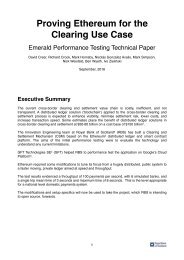Bitcoin and Cryptocurrency Technologies
1Qqc4BN
1Qqc4BN
Create successful ePaper yourself
Turn your PDF publications into a flip-book with our unique Google optimized e-Paper software.
When we think about a rational miner deciding whether or not to merge mine, we find more<br />
problems with the security of merge mining. Recall that roughly speaking, mining makes sense if the<br />
expected reward equals or exceeds the expected costs. For <strong>Bitcoin</strong> mining, the cost is primarily that of<br />
hash computation. But for someone who’s already a <strong>Bitcoin</strong> miner deciding whether or not to merge<br />
mine an altcoin, there is no additional cost from hashing. Instead, the additional costs arise from two<br />
factors: the computation, b<strong>and</strong>width, <strong>and</strong> storage needed to validate the altcoin transactions, <strong>and</strong><br />
need to keep software up to date <strong>and</strong> perhaps make informed decisions if the altcoin is undergoing<br />
hard or soft forks.<br />
This reasoning yields two insights. First, merge mining has strong economies of scale, because all<br />
miners incur roughly the same costs regardless of their hash power. This is in stark contrast to <strong>Bitcoin</strong><br />
where cost is proportional to hash power, to a first approximation. So for a low‐value altcoin, a small<br />
solo miner will find it unprofitable to merge mine it because the cost exceeds the meager reward they<br />
will make due to their low hash power. Keep in mind that as of 2015, the potential revenue from<br />
mining altcoins remains a small fraction of <strong>Bitcoin</strong> mining revenue. This predicts that compared to<br />
<strong>Bitcoin</strong>, merge‐mined altcoins will have a greater centralization or concentration of mining power.<br />
A related prediction is that most miners will choose to outsource their transaction validation. The<br />
smaller the altcoin, the greater the incentive to outsource. The natural way to do this is to join a<br />
<strong>Bitcoin</strong> mining pool. That’s because pools typically take those computations out of miners’ h<strong>and</strong>s. The<br />
pool operator assembles a <strong>Bitcoin</strong> block that incorporates blocks from (zero or more) altcoins, after<br />
validating the transactions in the <strong>Bitcoin</strong> block as well as all those altcoin blocks. The miner merely<br />
tries to solve for the nonce. These predictions are borne out in practice. For example, GHash.IO, at<br />
one time the largest <strong>Bitcoin</strong> mining pool, allows merge mining Namecoin, IXCoin <strong>and</strong> DevCoin. So<br />
those became the most popular merge‐mined altcoins.<br />
The second insight from the economic reasoning is perhaps even more worrying for security than the<br />
concentration of mining power. When miners’ primary cost is proof of work, by design there is no way<br />
for miners to “cheat”. There is no shortcut to mining given the security of hash functions, <strong>and</strong><br />
additionally, other miners easily can <strong>and</strong> will verify the proof of work. Both assumptions fail when the<br />
cost is that of transaction validation. A miner could assume that transactions they heard about are<br />
valid <strong>and</strong> hope to get away with it. Besides, for other miners to validate a block <strong>and</strong> its transactions is<br />
just as much work as it was for the miner who found it. For these reasons, we should expect that at<br />
least for small merge miners, there’s an incentive to skimp on validation. The existence of improperly<br />
validating miners makes attacks easier because a malicious miner can create a block that will cause<br />
the rest of the miners to disagree on what the longest valid branch is.<br />
To summarize, merge mining solves one security problem but creates many others, in part because<br />
the economics of merge mining differ in important ways from the economics of exclusive mining.<br />
Overall, it’s far from clear that merge mining is a good idea for a new altcoin concerned about mining<br />
attacks.<br />
279









